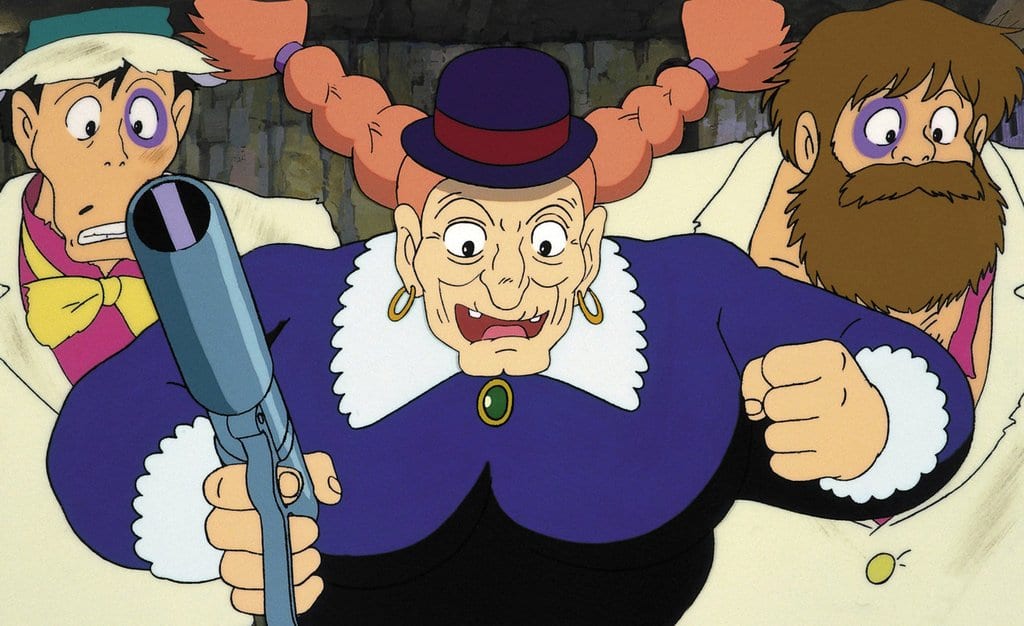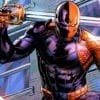REVIEW: Castle in the Sky (1986)
“The earth speaks to all of us, and if we listen, we can understand.”
After the success of Nausicaä of the Valley of the Wind, Hayao Miyazaki’s next film came two years later in the form of Castle in the Sky. I forgot to mention last week that Nausicaä was technically produced before Studio Ghibli was formed, making Castle in the Sky their official first film. However, I wanted to talk about Nausicaä because it’s so good, and it’s essential to the story of Hayao Miyazaki and Studio Ghibli. Nausicaä marked Miyazaki’s first collaboration with Isao Takahata, with whom he co-founded Ghibli and has worked ever since. The studio was founded in part due to Nausicaä‘s success, and it’s listed as a Ghibli film on HBO Max. Even the home video releases of Nausicaä and later posters and promotional materials bear the studio’s trademark logo.
Castle in the Sky opens aboard an airship besieged by pirates. A young girl named Sheeta (Anna Paquin), with a mysterious crystal necklace, escapes and falls off the ship. The crystal activates, and she slowly floats down to Earth, where a boy named Pazu (James Van Der Beek) finds her. The two spend the day on the run from pirates and the government, with the help of people in Pazu’s village. Pazu tells Sheeta about his father’s dreams of proving that Laputa, a floating city in the sky, exists. Sheeta, in turn, reveals her real name and identity as Lucita, the rightful Princess of Laputa. However, when Sheeta gets captured, Muska (Mark Hamill) clarifies how much danger Pazu is in. Sheeta begs Pazu to go home, and Muska offers money to sweeten the deal. Pazu reluctantly leaves as Sheeta asks, and when he gets home, he finds Dola (Cloris Leachman) and her pirate gang waiting for him. Taking a surprisingly righteous tone, Dola castigates the boy for leaving Sheeta with the military. Pazu promises to work hard and prove himself if he can go with Dola to steal Sheeta back, and they’re off. Meanwhile, Muska informs Sheeta that he already knows her real name and lineage. He tries to provoke Sheeta into activating her crystal’s power, but she denies any knowledge of these powers. When Muska leaves to convene with the General (Jim Cummings,) Sheeta mumbles a saying her grandmother taught her, which proves to be a spell. This activates both her crystal and a Laputian warrior robot Muska kept for research. Sheeta and the warrior make it to the roof, where the robot is nuked into oblivion by the General’s forces, and Sheeta is saved by Dola and Pazu just in time. Sheeta joins Dola’s crew, and together, they all set off to catch up with Muska’s ship, the Goliath, get Sheeta’s crystal back and save Laputa.

As you’ve probably noticed, this film has an impeccable voice cast. When the Disney dub came out in 2003, there was controversy over additional music added to the soundtrack and some changed dialogue. Overt references to 20,000 Leagues Under the Sea and Gulliver’s Travels were removed from the film. However, Laputa’s name remained the same, itself a reference to Gulliver’s Travels. The voice acting is the one aspect of this dubbed version that received universal acclaim, particularly for Mark Hamill and Cloris Leachman. I think this is a moot point, as this is Miyazaki’s preferred English dub over the 1989 Magnum version. It’s easy to see why Hamill, in particular, was applauded for his performance for Muska; I’ve always liked his voice work, and this is no exception. It is somewhat surreal that Hamill went from playing one of the most iconic heroes of all time to some of the greatest animated villains. I think the work he’s done displays a versatility for which he doesn’t get enough credit. I saw Castle in the Sky a few years ago, but I had forgotten what a compelling and surprising villain Muska is. At the beginning of the movie, the de facto antagonists are seemingly Dola and the military, specifically the General. In the early scenes between Muska and Sheeta, I genuinely got the sense that he was as harmless as an agent of the government can be. He seemed concerned for her safety and fascinated by Laputian culture. Of course, Muska proves to be VERY interested in Laputa itself, but not for any intellectual or humanitarian reasons. I think the film handles his ultimate reveal very well; it’s surprising, but makes perfect sense and doesn’t provoke too many questions. Hamill takes Muska from a cool-headed, logical thinker to a maniacally laughing lunatic throughout Castle in the Sky, and it’s entirely believable. The fact that both aspects of Muska are equally convincing is a feat in and of itself, and he’s even more impressive in the grand scheme of things. The General is definitely a villain, as his only apparent interest is to serve his country by locating and invading Laputa. But he turns out to be far less of a threat than the clever, scheming, manipulative Muska. The General is a brute whose only mode is attack, and as such, he makes no headway with Sheeta or her crystal. Dola is really a big softie who wants Sheeta’s necklace and the treasure of Laputa. Unlike Muska and the General, she doesn’t want to hurt anyone and quickly becomes a grandmother figure for both Sheeta and Pazu. Cloris Leachman is hysterical in this role. I love the dichotomy of her gruff exterior and the generous, caring grandma underneath. I do wish they weren’t quite so blunt with this characterization, though; at one point, Pazu even remarks that he can tell she’s nicer than she appears.

Dola’s family, who also serves as her pirate gang, provides much of the comedy in Castle in the Sky. Pazu becomes the assistant to Dola’s husband and engineer, Motro. Motro and Dola have an interesting relationship in that, despite their relative lack of shared screen time, you can tell they know one another so well. I really like a moment where Motro mentions that Sheeta reminds him of Dola when she was younger. It’s also quite funny when he bursts into tears after their ship, the Tiger Moth, has been destroyed, and Dola tells him to stop crying, and she’ll buy a new one. Their sons are endearing too, both in their adoration of Dola and their amusing attempts to win Sheeta over. Another of my favorite smaller scenes is when Sheeta is preparing dinner, and each of the brothers, unbeknownst to each other, helps her with her work in different ways. Of course, the central relationship in the film is between Sheeta and Pazu, and it works very well. They have a sort of ambiguous closeness, continually saving each other and working together exceptionally well. At times, it seems evident that they are or will be a couple, but the film never commits to pairing them, which, I think, is probably a good thing. Some things can be left to interpretation, and these characters are very young anyway. Anna Paquin is excellent as Sheeta, conveying all the right emotions and a lot of vulnerability. Her accent is inconsistent, which distracted me, and I’m not sure what they were going for. Still, it doesn’t ruin this outstanding performance. Sheeta isn’t like Mononoke or even Nausicaä; she’s a little girl who’s been drawn into a war she’d never even dreamt of. She’s scared, remorseful for involving Pazu, and eventually too exhausted to resist Muska’s schemes anymore. I don’t necessarily have a preference, and in fact, I love to see this kind of variety among female characters. Miyazaki’s leads, both male and female, never cease to impress me with their diversity in personality and appearance. They also tend to be balanced very well as protagonists. In this case, Sheeta is powerful in the literal sense of using her crystal to cast spells. Pazu, however, seems to have a stronger will and stomach. James Van Der Beek is also excellent as Pazu.

Castle in the Sky features a gorgeous by Joe Hisaishi, the same composer from Nausicaä. I’ll be mentioning him a lot in these reviews, as he’s worked with Miyazaki quite a bit. His work has gotten better and better throughout this collaboration, but it was already excellent in these earlier films. The visuals in Castle in the Sky are fantastic too. This movie is exceptionally colorful and uses lighting to great effect, especially when the crystals are involved. The character animation and expressions are spectacular, especially on Muska, as he slowly shows his true colors. I particularly love the look of scenes where Sheeta’s crystal activates, as well as the first time we really see Laputa, or any time Muska is on screen. On a side note, you can briefly see a group of fox squirrels just like Nausicaä’s pet Teto when Pazu and Sheeta arrive at Laputa.

Castle in the Sky continues Nausicaä‘s themes of preserving nature and the evils of war, but comes at it from a slightly different angle. In Sheeta’s world, there are still plenty of plants and animals thriving. Interestingly, the miners in Pazu’s town are shown as heroes, aiding and protecting the kids in the first half of the film. Uncle Pom (Richard Dysart) even explains Sheeta’s crystal and the etherium stones to her in the first place. Muska is even more interesting in this respect, contrasting his lack of respect for nature against Sheeta’s care for the animals and plants. Castle in the Sky is a little more subtle than Nausicaä of the Valley of the Wind, in which everyone except Nausicaä literally wanted to burn the forest and kill all the animals. The indifference of the army and Muska is a little more realistic than the outright hatred that the Tolmekians feel for the forest, but they’re also meant to represent different things. In Nausicaä, the fight against the forest and the Ohm were framed as essentially the same as the struggle between the warring nations. In Castle in the Sky, the Earth and its creatures are casualties of wars fought in the name of progress. Everyone wants to find Laputa, and the irony is that it’s a dead civilization, destroyed by its own hubris and opulence. Muska laments that the throne room is overrun with vines and roots, but not only is it a good thing, it’s the natural consequence of what Laputa was doing under the rule of Sheeta’s ancestors.
Verdict: Good
Castle in the Sky is a beautiful film with a soaring musical score and top-notch vocal performances. I prefer Nausicaä of the Valley of the Wind overall, but Castle in the Sky is infectious fun from start to finish.
Comments (7)

Thank you so much! I’m going through them as well, re-watching them all. Some for the first time.

I watched Castle in the Sky in Russian, after this review I will watch it in English as well.
I love Hamill’s Joker voice, did not knew that he voiced Muska.
Hope you review more Miyazaki other works.

I just saw this for the first time last year and I love this movie now!

I used to really sleep on the movie. The subject matter didn’t seem as interesting as other Ghibli films like Howl’s Moving Castle or Princess Mononoke. Boy was I mistaken! I happened to catch this movie a few years ago when Ghibli Fest was passing through, and I was totally blown away. It’s easily one of my favorites of all time now. Whatever you do, don’t miss this film!
A great follow up after Nausicaa. You know Mark Hamill had lend his voice in the latter film as well. I pretty much liked all the actors in it. Cloris Leachman will forever be remembered in this. I love the chemistry between Sheeta and Pazu and I like how the score by Joe Hisashi is reminiscent to the likes of John Williams, Basil Poledouris and even a hint of Danny Elfman during the Laputa destruction scene. I also liked the designs of the flying ships and we’ll be seeing more of that in future Miyazaki films due to love of flight and airplanes.
I like the more symphonic musical score by Joe Hisashi than the electronic score he made at first which can be heard on the HBO Max version. His latter score reminds me of the works of John Williams and Basil Poledouris in terms of the adventurous tone the movie has and I love the destruction cue which reminds me of choirs used in a soundtrack by Danny Elfman.








I’m watching Studio Ghibli movies in these past months, watched this one last week, crazy! :D Great Review. Looking forward for more.